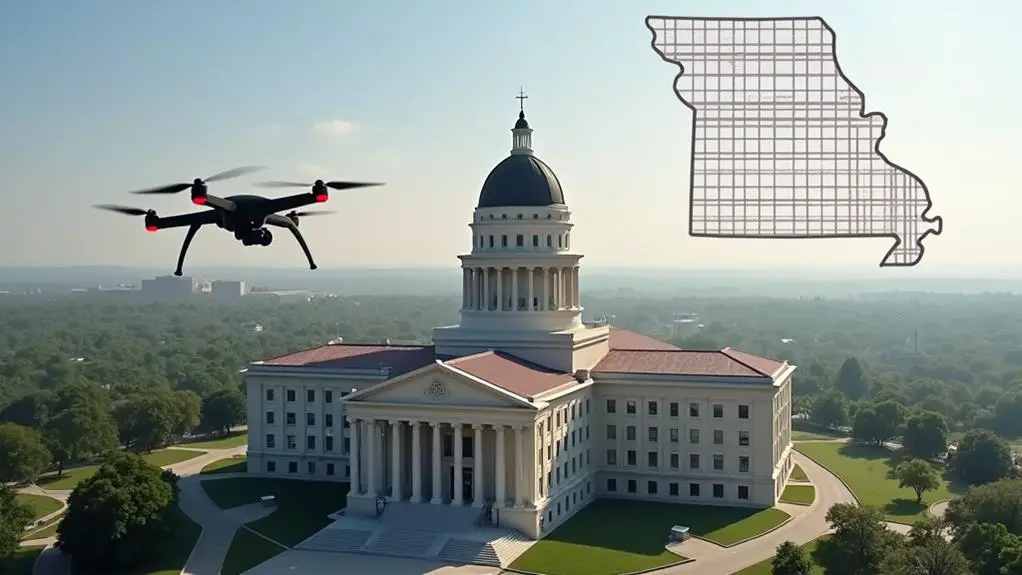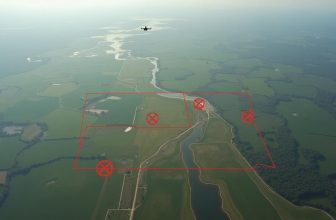
As you take to the skies with your drone in Missouri, don't assume the open air is yours for the taking – it's a realm of rules and regulations. You're likely aware that the Federal Aviation Administration (FAA) has a say in drone operations nationwide, but what specific laws and guidelines govern drone use in the Show-Me State? From registration requirements to no-fly zones and operational restrictions, understanding Missouri's drone laws is crucial to avoiding costly fines and liabilities. But where do you start, and what specific regulations will you need to comply with to ensure your flying days stay trouble-free?
Contents
Key Takeaways
- In Missouri, drones weighing 0.55-55 pounds must be registered with the FAA for a $5 fee, valid for three years.
- No-Fly Zones in Missouri include national parks, military bases, and restricted airspace.
- Drone operations in Missouri are subject to airspace limitations, including flying below 400 feet above ground level.
- Commercial drone operators must obtain a pilot certification and register their drone with the FAA.
- Recreational drone operators must register their drone and maintain a visual line of sight to avoid collisions.
Drone Registration Requirements
When considering the operation of a drone in various jurisdictions, you must adhere to the regulations regarding drone registration requirements, which lay out specific guidelines for the registration process.
In Missouri, the Federal Aviation Administration (FAA) oversees the registration process for drones that weigh between 0.55 and 55 pounds. To register your drone, you'll need to create an account on the FAA's website and provide basic information about yourself and your drone.
The registration process typically takes a few minutes to complete, and you'll need to pay a drone fee of $5. This fee is non-refundable and is valid for three years.
Once you've completed the registration process, you'll receive a unique registration number that you must display on your drone. It's essential to note that registration requirements may vary depending on the jurisdiction and the type of drone you're operating.
You must ensure you comply with all applicable regulations to avoid penalties or fines. Failure to register your drone can result in civil penalties of up to $27,500 or even criminal penalties, including fines of up to $250,000 and imprisonment.
No-Fly Zones in Missouri
In Missouri, you'll frequently find restrictions on drone operations in designated No-Fly Zones, which the Federal Aviation Administration (FAA) and local authorities have established to protect people and property.
These zones are marked on aeronautical charts and are communicated through the FAA's B4UFLY app, which you can use to plan safe and compliant drone flights.
Some examples of No-Fly Zones in Missouri include National Parks, such as Gateway Arch National Park and Ozark National Scenic Riverways.
These parks are protected areas with sensitive wildlife and ecosystems that drones could potentially disrupt.
Additionally, Military Bases in Missouri, like Whiteman Air Force Base and the Missouri National Guard's Camp Clark, are also off-limits to drones.
These bases have restricted airspace for security reasons, and drone operations near them could pose a risk to national security.
Before flying your drone in Missouri, you must familiarize yourself with these No-Fly Zones to avoid any potential risks or penalties.
Always check for updates and follow the FAA's guidelines to ensure safe and responsible drone operations.
Operational Restrictions
Drone operations in Missouri are subject to various restrictions that you must comply with to ensure safe and responsible flying.
These operational restrictions are designed to prevent accidents, protect people and property, and maintain the integrity of the airspace.
You must comply with airspace limitations, which include flying below 400 feet above ground level and maintaining a safe distance from airports, heliports, and other aviation facilities.
Additionally, you're prohibited from flying in restricted airspace, such as military bases, national parks, and areas with temporary flight restrictions.
Weather restrictions also apply to drone operations in Missouri.
You aren't allowed to fly in bad weather, such as heavy rain, thunderstorms, or strong winds.
You must also be aware of changing weather conditions and adjust your flight plan accordingly.
It's your responsibility to check the weather forecast before and during flight to ensure safe and responsible operation.
Failure to comply with these restrictions may result in fines, penalties, or other enforcement actions.
Commercial Drone Regulations
As you're now aware of the operational restrictions governing drone operations in Missouri, you must also consider the specific regulations that apply to commercial drone activities.
The Federal Aviation Administration (FAA) requires commercial drone operators to follow strict guidelines to ensure safe and lawful operations. To operate a drone commercially in Missouri, you'll need to obtain a pilot certification from the FAA, which involves passing a knowledge test and registering your drone.
Additionally, you'll need to obtain drone insurance that covers your operations. The type and amount of coverage will depend on the specific nature of your commercial activities, such as aerial photography or surveying.
It's essential to research and understands the insurance requirements to avoid any potential liabilities. Furthermore, you must comply with all applicable regulations, including maintaining a visual line of sight with your drone, respecting airspace restrictions, and adhering to right-of-way rules.
Recreational Drone Laws
Your drone's recreational use in Missouri is subject to specific regulations.
As a recreational drone operator, you must comply with the Federal Aviation Administration's (FAA) guidelines and Missouri state laws to ensure a safe and enjoyable flying experience.
To operate a recreational drone in Missouri, you must follow these regulations:
- Register your drone: If your drone weighs more than 0.55 pounds and less than 55 pounds, you must register it with the FAA.
- Maintain visual line of sight: Keep your drone within your visual line of sight to avoid collisions with other aircraft or obstacles.
- Respect airspace restrictions: Don't fly your drone in restricted airspace, such as near airports, national parks, or military bases.
- Address privacy concerns: Be mindful of aerial photography and respect individuals' right to privacy by not capturing images or video of private property without permission.
Recreational drone operators must also be aware of Missouri state laws and regulations, which may include additional restrictions on drone usage.
Frequently Asked Questions
Can I Fly a Drone at Night in Missouri With Special Lighting?
You can't fly at night without special permits, but Missouri allows night flight with a waiver from the FAA and proper anti-collision lighting, which is crucial for safe navigation and visibility in low-light conditions.
Are There Any Age Restrictions for Flying Drones in Missouri?
You're required to be at least 13 years old to operate drones recreationally, but there's no minimum age for flying under adult supervision, emphasizing the importance of pilot training and drone education for young enthusiasts.
Can I Use a Drone for Recreational Purposes in State Parks?
Cut to the chase, you're eager to fly your drone in Missouri's state parks for fun. Before you take off, you'll need to brush up on park rules and State regulations, which often restrict drone usage.
Can I Fly a Drone Near a Heliport in Missouri?
When flying near a heliport, you must adhere to airspace rules, ensuring you don't compromise helipad safety. Maintain a safe distance, and avoid interfering with helicopter operations to prevent potential hazards and collisions.
Do I Need Insurance to Fly a Drone in Missouri?
Navigating drone regulations is like charting unexplored skies. You'll want to ensure you're protected with drone coverage, as Missouri requires liability policies for certain drone operations, safeguarding you against potential risks and financial losses.
Conclusion
As you navigate the skies of Missouri with your drone, remember that knowledge is power. The web of regulations – from registration requirements to no-fly zones – can seem complex, but understanding these rules is key to avoiding liabilities. Don't fly blind; instead, chart your course carefully, and you'll find that compliance is the wind beneath your wings, lifting you to safe and responsible drone operation.






